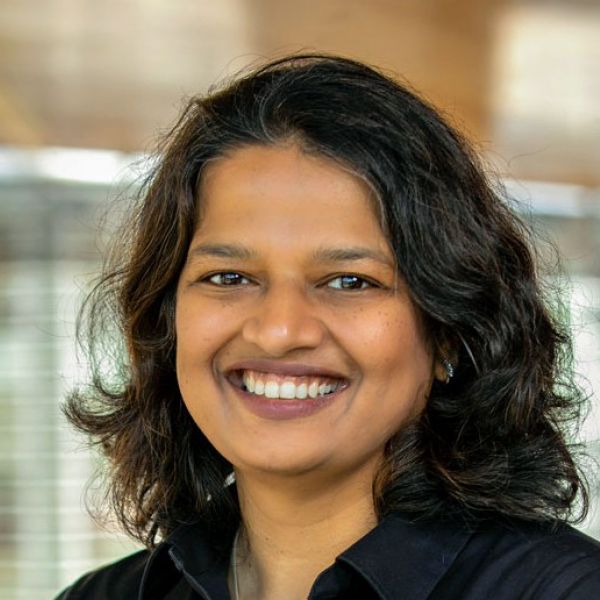Kavita Bala, professor and chair of computer science, has been named dean of the Faculty of Computing and Information Science (CIS), Provost Michael Kotlikoff announced June 5.
Bala, a leading expert in computer graphics and computer vision, has served as chair of the Department of Computer Science since 2018. She will assume her new post Aug. 15.
“Kavita is one of our most distinguished scholars, as well as an experienced entrepreneur, as well as an outstanding teacher and administrator,” Kotlikoff said. “As a researcher whose innovative work crosses disciplines and frequently bridges the divide between academia and industry, she is an ideal leader for Computing and Information Science.”
Bala succeeds Jon Kleinberg ’93, the Tisch University Professor of Computer Science, who has served as interim dean of CIS since August 2019.
Bala’s appointment, which runs through June 30, 2025, was approved by the Executive Committee of the Cornell University Board of Trustees. CIS, a college-level unit, comprises the Departments of Computer Science, Information Science, and Statistics and Data Science.
“I am honored to be given the opportunity to serve as CIS dean,” Bala said. “Since its inception more than 20 years ago, CIS has been a trailblazer, recognizing early the profound importance of computing and information technology and its impact on society. CIS is poised to meet the difficult challenges of our time through our vision of foundational and interdisciplinary research that explores cutting-edge, responsible technology for future needs.”
CIS has experienced explosive growth in recent years, with its faculty teaching 1 in 10 Cornell students on the Ithaca campus. Its pioneering structure – with computer and information science researchers housed together in Bill & Melinda Gates Hall, and faculty affiliations spanning Cornell’s colleges – enables the study of technology’s ethical implications and encourages collaborations that touch nearly every discipline.
“Technology is transforming society and upending age-old institutions,” Bala said. “CIS has long recognized that technology can have a powerful, positive impact but can also have negative consequences. We believe that by understanding the societal impact of technology, we can design technology that improves people’s lives.”
As chair of the Department of Computer Science, Bala led aggressive recruiting efforts, working to expand the department’s presence in robotics and artificial intelligence, as well as supporting diversity among CIS students and faculty and increasing opportunities for undergraduate research and entrepreneurship.
As dean, her goals include fostering interdisciplinary research and educational initiatives; deepening connections between the Ithaca campus and Cornell Tech; and broadening participation in CIS.
“This is a time of unprecedented challenges that have disproportionately impacted people of color,” Bala said. “I’m keenly aware of our responsibility to address inequities within our fields and beyond, while also educating the next generation of Cornell students to be agents of positive change.”
Efforts to increase representation at CIS include programs such as the SoNIC summer workshop, which aims to encourage students from underrepresented backgrounds to pursue advanced degrees in computing, and the new Pre-Sophomore Summer Program in Computer Science, to help improve retention of underrepresented students in Cornell’s computer science major. CIS supports student groups including Women in Computing at Cornell and Underrepresented Minorities in Computing at Cornell, which help build community and support students from diverse backgrounds.
“We have great programs and organizations, and we face huge challenges,” Bala said. “There is much work for us to do together as we go forward.”
In her research, Bala specializes in computer vision and computer graphics, leading research in visual recognition, physically based rendering, and material modeling and perception.
She co-founded the startup GrokStyle, which drew Ikea as a client and was acquired by Facebook in 2019. Her work on scalable rendering technology has been adopted in industrial products for virtual design and prototyping. Her work on 3D mandalas was featured at the Rubin Museum of Art in New York City in 2008.
She is a fellow of the Association for Computing Machinery (ACM), was the recipient of the 2020 ACM SIGGRAPH Computer Graphics Achievement Award and has served as editor-in-chief of the journal Transactions on Graphics. She is the recipient of Cornell Engineering’s Fiona Li and Donald Li Excellence in Teaching Award (2015) and James and Mary Tien Excellence in Teaching Award (2006 and 2009).
Bala has a bachelor’s degree from the Indian Institute of Technology in Bombay, India, and received her master’s and doctoral degrees from the Massachusetts Institute of Technology. She joined Cornell as a postdoctoral researcher in the program of computer graphics in 1999 and became an assistant professor of computer science in 2002.
This story, written by Melanie Lefkowitz, originally appeared at the Cornell Chronicle on June 5, 2020.



